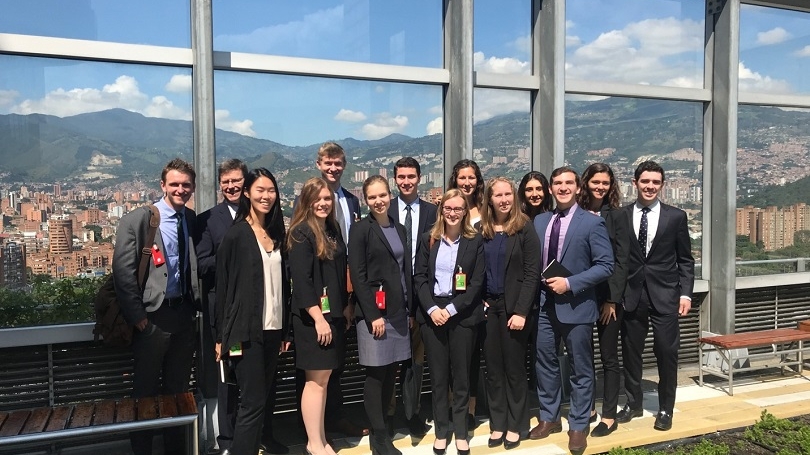
- Public Policy
- Leadership
- Funding
- News & Events
- About the Center
Back to Top Nav
Back to Top Nav
Back to Top Nav
Back to Top Nav
After meeting with many representatives from government agencies and non-governmental organizations, the PBPL 85 group was incredibly excited to meet with one of Colombia’s most successful companies for a perspective of the private sector: Grupo-EPM. Grupo-EPM operates at the intersection of the private sector and the conflict facing Colombia.
As the central utility company of Colombia, Grupo-EMP is both a private entity and an extension of the state due to its crucial role in providing access to public services for Colombians. However, Grupo-EPM has recently expanded its operations beyond Colombia by acquiring over 47 subsidiary companies that span Latin America and Central America, where it delivers natural gas, electricity, power, and potable water to millions people. Furthermore, Grupo-EPM is at the forefront of development and sustainability with an impressive approach to business that is directly linked to their corporate social responsibility policies that require Grupo-EPM to both maximize providing the most coverage across Colombia for public utilities and ensuring protection of the environment in all its operations.
When speaking with Grupo-EPM, we heard first hand how difficult it is to juggle the business related concerns of profitability and the public’s call for improved access to water, electricity, and other crucial infrastructure that offer public services for all Colombians. However, despite being Colombia’s only public utility company, a representative of Grupo-EPM explained that they have little to no role in assisting the FARC reintegration camps, also known as ETCRs, due to the lack in profitability and adequate security to partake in expanding access to infrastructure to these isolated reintegration camps. A takeaway from this meeting was understanding that the government itself must play a more active role in providing infrastructure and access to public services for all Colombians in the implementation of the peace deal when economic disincentives hinder the ability of the private sector to provide much needed support to the most vulnerable and isolated rural communities.
After enjoying the 360 degree view at the rooftop of the Grupo-EPM building, the PBPL 85 group checked out the Museum of Antioquia where an incredible exhibit of some of Botero’s finest collection was on display. Other wonderful Latin American artwork filled the halls of the museum and the courtyard just outside the museum.
Getting to relax and explore the museum and the downtown center of Medellin was a much needed break for the PBPL 85 students before they embark on a +7-hour bus ride tomorrow to Salento, which is a region of Colombia known for growing some of the world’s best coffee. The group is looking forward to getting to explore this new rural region, make the most of their down time to work on the group’s final policy memo, and drink some delicious coffee! We look forward to checking in with you then.
Written by Billy Kosmidis '19, 18F PBPL 85: Global Policy Leadership course participant
This is part of a series where PBPL 85:Global Policy Leadership students reflect on their experiences during the two-week field research portion of course. While in country, students meet with local policy leaders: politicians, academics, civil society leaders, journalists, business leaders, diplomats, and other in-country experts who help inform their analyses.